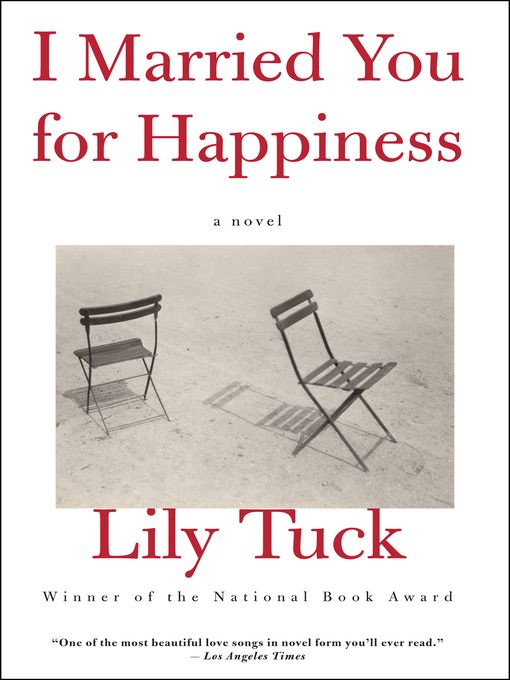
I Married You for Happiness
A Novel
- اطلاعات
- نقد و بررسی
- دیدگاه کاربران
نقد و بررسی

Starred review from June 6, 2011
A breathlessly mannered, affecting new work by National Book Awardâwinner Tuck (The News from Paraguay) tracks a Boston wife's random, reflective chain of thoughts as she sits at her dead husband's bedside. Philip, a senior mathematician at an MIT-sounding institution in Cambridge, Mass., goes into cardiac arrest as he naps before dinner. Nina, a painter, and his wife of 42 years, decides to spend the night alone with Philip's body in their Boston bedroom, drinking wine, and remembering. The couple met in the early 1960s in Paris; she worked at an art gallery and read Natalie Saurraute; he was a student, steeped in numbers, probability theory, and the uselessness of reason in trying to prove infinity, or that God existsâà la Pascal. Layered memories, somewhat pell-mell, build suspense: from Philip's honeymoon confession (never mentioned again) of the consequences of a drunk-driving accident in his youth, to Nina's secret abortion, the father indeterminate; and their only child, Louise, now in her 30s, harbors a troubling hostility toward her mother. In the end, the love Nina and Philip have for each other is unproven and unpredictable, except in these small, vital snapshots that make up two lives closely shared, and beautifully portrayed in this triumph of a novel.

August 15, 2011
Using shards of memory, Tuck creates the portrait of a marriage in her latest, following the NBA winner The News from Paraguay (2004, etc.).
Nina and Philip have been married for 42 years. He's a university mathematician, she's an artist. His death is as quiet as the fall of a leaf. He returns to their Massachusetts home to rest before dinner. Nina finds him dead. Cardiac arrest, says her neighbor, an endocrinologist. Here Tuck suspends time, allowing Nina, during the night ahead, to sift through the memories and images from their life together. Tuck uses a loose variation of a binary, Hegelian model. On the one hand are the mathematical formulations spelled out by Philip in the lecture hall and over the dinner table; he's a popular, witty teacher. Numbers represent logic and order; they are beyond time. In opposition are Nina's memories, their wild disorder at the mercy of time. These are "the manifestations of the inner self," Nina's reference to a Nathalie Sarraute novel she's reading when Philip hits on her at a café in Paris, their first meeting. It is daring of Tuck to set their courtship in Paris, such well-trodden ground for young lovers. The result is a somewhat synthetic charm. What's real, shockingly so, is Nina's rape by Philip's French cousin in a forest outside the city. Nina never told Philip about the rape or its consequence, a risky back-alley abortion; another secret was her one infidelity, a summer fling with a yachtsman in Brittany. Was Philip faithful to her? Nina doesn't know, but she has a jealous temperament, an irritant among her many happy memories of lovemaking, meals and shared laughter. Another possible irritant, the contrast between Philip's successful career and Nina's failure to make it commercially, goes unaddressed, a disconcerting omission masked by exotic vacation travel writing.
Does the couple's mutual happiness provide a Hegelian synthesis? Not quite, though Tuck's crisp writing is a joy.
(COPYRIGHT (2011) KIRKUS REVIEWS/NIELSEN BUSINESS MEDIA, INC. ALL RIGHTS RESERVED.)

May 1, 2011
As this novel opens, a woman sits holding the hand of her husband, who has died unexpectedly. She reflects on their tender and tumultuous life together, starting with their meeting in Paris as artist and mathematician; they are united in love though they are from such different worlds. Expect the author of the National Book Award winner The News from Paraguay to turn in something burnished and sophisticated.
Copyright 2011 Library Journal, LLC Used with permission.

September 1, 2011
This short, affecting, original novel, by the author of the National Book Awardwinning The News from Paraguay (2004), which was also an effective and unique novel (about a nineteenth-century South American dictator), takes readers of literary fiction to a place that could have afforded a macabre experience but is saved by the sensitivity of the author. The premise is not complicated. Late-middle-aged Nina discovers that her husband, Philip, who appears to be napping, has actually died in his sleep, and she sits by his bedside for a whole night. Of course, Nina's thoughts are going to be centered on their life together, but, naturally, they do not follow in any logical order. These mental perambulations through their marriage form the substance of the novel. Tuck thoroughly understands why a wife would desire to do this and, as a consequence, makes the act a sweet one, rich in sentiment, poignancy, and honesty. The result is that the reader imagines that this kind of personal tribute to a now-deceased loved one is absolutely appropriate.(Reprinted with permission of Booklist, copyright 2011, American Library Association.)




دیدگاه کاربران